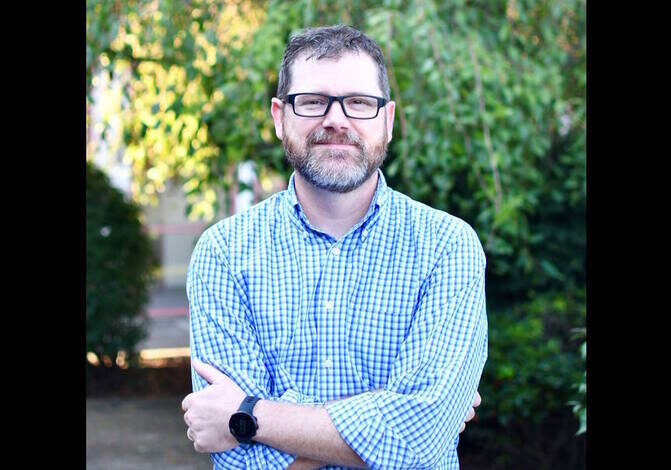
Greg Hillis, Beloved Executive Director of Aquinas Center of Theology and Celebrated Writer for America Magazine, Dies of Cancer at 51
Greg Hillis, Beloved Executive Director of Aquinas Center of Theology and Celebrated Writer for America Magazine, Dies of Cancer at 51: A Theological Scholar and Friend of Many Leaves a Legacy of Thought-Provoking Works on Suffering, Spirituality, and Catholicism After a Courageous Battle with Cholangiocarcinoma”
The passing of Greg Hillis, Executive Director of the Aquinas Center of Theology at Emory University, has left a deep and lasting impact on both the academic and religious communities. Greg, a writer for America magazine and a beloved friend to many in the theological world, succumbed to complications from cholangiocarcinoma, a rare form of bile duct cancer, after a valiant battle. His death at the age of 51 has triggered a wave of grief, not only among those who knew him personally but also among the broader community of readers, scholars, and theologians who admired his work. Greg’s life was marked by a profound dedication to theology, a relentless pursuit of understanding suffering, and a deep sense of compassion that permeated all he did. His writing on theology, suffering, and spirituality will continue to inspire generations long after his death.
Born in Alberta, Canada, Greg Hillis’ early life did not suggest that he would become one of the most influential theological voices of his generation. Raised in a Protestant family, Greg’s journey to Catholicism was anything but straightforward. It was during his studies at McMaster University in Hamilton, Ontario, that Greg’s theological curiosity began to deepen, eventually leading him to convert to Catholicism in 2007 while pursuing his PhD. This conversion was not just a change of faith but a transformational moment in his life, shaping his scholarship, his worldview, and his interactions with the people around him. His academic career quickly became distinguished, particularly for his expertise in the theology of Cyril of Alexandria and his extensive writings on the Church Fathers. But it was his growing affinity with Thomas Merton that would truly define the latter part of his life.
Over the years, Greg published a wide range of works that explored the intersections of faith, suffering, and the human condition. His book, Man of Dialogue: Thomas Merton’s Catholic Vision, which was published in 2021, earned him the prestigious first-place biography award from the Catholic Media Association. In this work, Greg delved into Merton’s philosophy, exploring the many ways in which Merton’s life and writings could offer insights into contemporary Catholic thought. Greg’s own life seemed to mirror many of the lessons he drew from Merton’s contemplative works, particularly in how he embraced suffering as a spiritual and transformative experience. His writing was often marked by a profound honesty and vulnerability, especially when it came to his personal struggles.
One year before his death, Greg wrote movingly about his diagnosis and treatment for America magazine. He did not shy away from describing the stark realities of living with terminal cancer, instead confronting the situation head-on with a mix of intellectual curiosity, spiritual reflection, and raw emotion. In these writings, Greg shared how his illness had altered not only his body but also his perspectives on life, death, and faith. His reflections became a source of comfort for many readers, especially those grappling with their own experiences of illness and mortality. His exploration of suffering was not confined to abstract theological arguments; rather, it was deeply personal, shaped by his own battle with a disease that had an unforgiving trajectory.
The clarity with which Greg wrote about his own impending death was both heart-wrenching and illuminating. He often shared how Merton’s works had become a source of companionship for him during his most difficult moments, a reminder that suffering is not a solitary experience but one shared by the whole of humanity, and even by God himself in the person of Jesus Christ. One of his most poignant reflections came in an essay for America, in which he described how Merton’s The Seven-Storey Mountain had profoundly influenced him during a time of personal and professional hardship. Greg found solace in Merton’s words, feeling as though the famed monk had become a companion in his own spiritual journey through illness. He often said that Merton’s story became intertwined with his own, and that in reading Merton, he found both comfort and companionship.
Greg’s deep engagement with theological questions around suffering came to the forefront in another essay, where he wrote candidly about his son’s question: Is it okay to be angry with God? Greg drew from Julian of Norwich’s theology of suffering to answer that question. He wrote about how Julian’s understanding of Christ suffering alongside humanity offered him a new way of thinking about his own battle with cancer. In that essay, Greg admitted that while he had never found a truly theologically satisfying answer to why suffering exists, the idea that God suffers alongside humanity brought him great comfort. This concept, though controversial among some theologians, resonated deeply with Greg. He wrote that it was this belief—that God suffers with us—that had allowed him to transform his anger into love and his suffering into something more profound.
His insights into suffering and faith were further deepened by his April 2024 trip to Rome, a pilgrimage he undertook while undergoing cancer treatment. During his visit to the city’s churches and shrines, Greg encountered relics of various saints, including St. Stephen of Sinai, a sixth-century hermit, and St. John XXIII. These relics provided him with new perspectives on his own suffering and mortality. He wrote about how, in the presence of these relics, he felt a deep connection to the broader communion of saints, and how the physicality of relics reminded him of the importance of the body in Christian theology. Despite his illness, Greg was able to find beauty and meaning in the messiness of human existence. His reflections on that trip offered profound insights into how physical suffering can coexist with spiritual grace.
In June 2023, Greg was appointed Executive Director of the Aquinas Center of Theology at Emory University in Atlanta, Georgia. This appointment marked a new chapter in his career, following 15 years of teaching at Bellarmine University in Louisville, Kentucky. His tenure at Emory was tragically cut short by his illness, but his brief time at the Aquinas Center was marked by the same passion and dedication that had defined his entire career. Colleagues and students alike remember Greg as a kind and compassionate leader, always willing to offer a listening ear or a word of encouragement. His deep knowledge of theology, combined with his personal warmth, made him a beloved figure both inside and outside the classroom.
Throughout his career, Greg was also a prolific writer, contributing to several publications, including Commonweal and America. His articles spanned a wide range of topics, from liturgy and contemplative religious life to baseball and motherhood. But no matter the topic, Greg’s writing was always characterized by a deep intellectual rigor and a heartfelt sincerity. His ability to write about complex theological concepts in a way that was accessible to a broad audience made him a sought-after contributor, and his works have left a lasting impact on readers around the world.
Greg’s death is not just a personal loss for those who knew and loved him, but a significant loss for the wider Catholic and theological community. His ability to bridge the gap between academic theology and the lived experience of faith was a rare gift, one that will be sorely missed. His writings on suffering, in particular, will continue to resonate with those who find themselves grappling with illness, loss, and the complexities of human existence.
In the days following his death, tributes to Greg poured in from all corners of the world. Former students, colleagues, and readers all spoke of the profound influence he had on their lives, both through his writing and through his personal interactions. Many described him as a mentor, a friend, and a source of inspiration. His kindness, humility, and wisdom left an indelible mark on those who had the privilege of knowing him, and his legacy will live on through the many lives he touched.
As the Catholic community continues to mourn the loss of Greg Hillis, there is a sense that his work is far from finished. His reflections on suffering, faith, and the human condition remain as relevant as ever, offering a roadmap for those who seek to navigate the complexities of life with grace and dignity. Greg’s life was a testament to the power of faith in the face of adversity, and his death, though tragic, serves as a reminder of the profound truths that can be found in suffering. As we remember Greg, we are reminded that his legacy is not just one of academic achievement, but one of deep compassion, unwavering faith, and a commitment to helping others find meaning in their own struggles.



